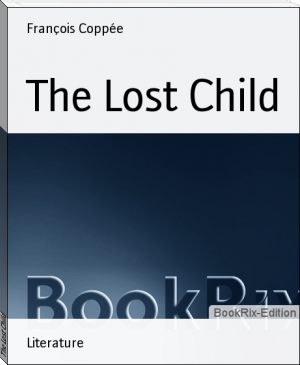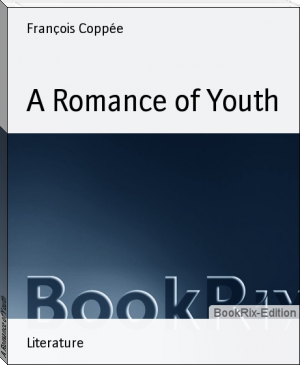International Short Stories: French - - (new books to read .TXT) 📗

- Author: -
- Performer: -
Book online «International Short Stories: French - - (new books to read .TXT) 📗». Author -
This eBook is for the use of anyone anywhere at no cost and with
almost no restrictions whatsoever. You may copy it, give it away or
re-use it under the terms of the Project Gutenberg License included
with this eBook or online at www.gutenberg.net
Title: International Short Stories: French
Author: Various
Release Date: January 2, 2004 [EBook #10577]
Last Updated: August 24, 2018
Language: English
*** START OF THIS PROJECT GUTENBERG EBOOK FRENCH SHORT STORIES ***
Etext produced by Juliet Sutherland, David Schaal and PG Distributed
Proofreaders
HTML file produced by David Widger
INTERNATIONAL SHORT STORIES FRENCH STORIES By Various Authors Compiled By Francis J. Reynolds 1910
CONTENTS
A PIECE OF BREAD By Francois Coppee
THE ELIXIR OF LIFE By Honore De Balzac
THE AGE FOR LOVE By Paul Bourget
MATEO FALCONE By Prosper Merimee
THE MIRROR By Catulle Mendes
MY NEPHEW JOSEPH By Ludovic Halevy
A FOREST BETROTHAL By Erckmann-Chatrian
ZADIG THE BABYLONIAN By Francois Marie Arouet De Voltaire
ABANDONED By Guy De Maupassant
JEAN MONETTE By Eugene Francois Vidocq
SOLANGE—DR. LEDRU’S STORY OF THE REIGN OF TERROR By Alexandre Dumas
THE BIRDS IN THE LETTER-BOX By Rene Bazin
JEAN GOURDON’S FOUR DAYS By Emile Zola
BARON DE TRENCK By Clemence Robert
THE PASSAGE OF THE RED SEA By Henry Murger
THE WOMAN AND THE CAT By Marcel Prevost
GIL BLAS AND DR. SANGRADO By Alain Rene Le Sage
A FIGHT WITH A CANNON By Victor Hugo
TONTON By A. Cheneviere
THE LAST LESSON By Alphonse Daudet
CROISILLES By Alfred De Musset
THE VASE OF CLAY By Jean Aicard
A PIECE OF BREAD By Francois Coppee
The young Duc de Hardimont happened to be at Aix in Savoy, whose waters he hoped would benefit his famous mare, Perichole, who had become wind-broken since the cold she had caught at the last Derby,—and was finishing his breakfast while glancing over the morning paper, when he read the news of the disastrous engagement at Reichshoffen.
He emptied his glass of chartreuse, laid his napkin upon the restaurant table, ordered his valet to pack his trunks, and two hours later took the express to Paris; arriving there, he hastened to the recruiting office and enlisted in a regiment of the line.
In vain had he led the enervating life of a fashionable swell—that was the word of the time—and had knocked about race-course stables from the age of nineteen to twenty-five. In circumstances like these, he could not forget that Enguerrand de Hardimont died of the plague at Tunis the same day as Saint Louis, that Jean de Hardimont commanded the Free Companies under Du Guesclin, and that Francois-Henri de Hardimont was killed at Fontenoy with “Red” Maison. Upon learning that France had lost a battle on French soil, the young duke felt the blood mount to his face, giving him a horrible feeling of suffocation.
And so, early in November, 1870, Henri de Hardimont returned to Paris with his regiment, forming part of Vinoy’s corps, and his company being the advance guard before the redoubt of Hautes Bruyères, a position fortified in haste, and which protected the cannon of Fort Bicêtre.
It was a gloomy place; a road planted with clusters of broom, and broken up into muddy ruts, traversing the leprous fields of the neighborhood; on the border stood an abandoned tavern, a tavern with arbors, where the soldiers had established their post. They had fallen back here a few days before; the grape-shot had broken down some of the young trees, and all of them bore upon their bark the white scars of bullet wounds. As for the house, its appearance made one shudder; the roof had been torn by a shell, and the walls seemed whitewashed with blood. The torn and shattered arbors under their network of twigs, the rolling of an upset cask, the high swing whose wet rope groaned in the damp wind, and the inscriptions over the door, furrowed by bullets; “Cabinets de societé—Absinthe—Vermouth—Vin à 60 cent. le litre”—encircling a dead rabbit painted over two billiard cues tied in a cross by a ribbon,—all this recalled with cruel irony the popular entertainment of former days. And over all, a wretched winter sky, across which rolled heavy leaden clouds, an odious sky, angry and hateful.
At the door of the tavern stood the young duke, motionless, with his gun in his shoulder-belt, his cap over his eyes, his benumbed hands in the pockets of his red trousers, and shivering in his sheepskin coat. He gave himself up to his sombre thoughts, this defeated soldier, and looked with sorrowful eyes toward a line of hills, lost in the fog, where could be seen each moment, the flash and smoke of a Krupp gun, followed by a report.
Suddenly he felt hungry.
Stooping, he drew from his knapsack, which stood near him leaning against the wall, a piece of ammunition bread, and as he had lost his knife, he bit off a morsel and slowly ate it.
But after a few mouthfuls, he had enough of it; the bread was hard and had a bitter taste. No fresh would be given until the next morning’s distribution, so the commissary officer had willed it. This was certainly a very hard life sometimes. The remembrance of former breakfasts came to him, such as he had called “hygienic,” when, the day after too over-heating a supper, he would seat himself by a window on the ground floor of the Café-Anglais, and be served with a cutlet, or buttered eggs with asparagus tips, and the butler, knowing his tastes, would bring him a fine bottle of old Léoville, lying in its basket, and which he would pour out with the greatest care. The deuce take it! That was a good time, all the same, and he would never become accustomed to this life of wretchedness.
And, in a moment of impatience, the young man threw the rest of his bread into the mud.
At the same moment a soldier of the line came from the tavern, stooped and picked up the bread, drew back a few steps, wiped it with his sleeve and began to devour it eagerly.
Henri de Hardimont was already ashamed of his action, and now with a feeling of pity, watched the poor devil who gave proof of such a good appetite. He was a tall, large young fellow, but badly made; with feverish eyes and a hospital beard, and so thin that his shoulder-blades stood out beneath his well-worn cape.
“You are very hungry?” he said, approaching the soldier.
“As you see,” replied the other with his mouth full.
“Excuse me then. For if I had known that you would like the bread, I would not have thrown it away.”
“It does not harm it,” replied the soldier, “I am not dainty.”
“No matter,” said the gentleman, “it was wrong to do so, and I reproach myself. But I do not wish you to have a bad opinion of me, and as I have some old cognac in my can, let us drink a drop together.”
The man had finished eating. The duke and he drank a mouthful of brandy; the acquaintance was made.
“What is your name?” asked the soldier of the line.
“Hardimont,” replied the duke, omitting his title. “And yours?”
“Jean-Victor—I have just entered this company—I am just out of the ambulance—I was wounded at Châtillon—oh! but it was good in the ambulance, and in the infirmary they gave me horse bouillon. But I had only a scratch, and the major signed my dismissal. So much the worse for me! Now I am going to commence to be devoured by hunger again—for, believe me, if you will, comrade, but, such as you see me, I have been hungry all my life.”
The words were startling, especially to a Sybarite who had just been longing for the kitchen of the Café-Anglais, and the Duc de Hardimont looked at his companion in almost terrified amazement. The soldier smiled sadly, showing his hungry, wolf-like teeth, as white as his sickly face, and, as if understanding that the other expected something further in the way of explanation or confidence:
“Come,” said he, suddenly ceasing his familiar way of speaking, doubtless divining that his companion belonged to the rich and happy; “let us walk along the road to warm our feet, and I will tell you things, which probably you have never heard of—I am called Jean-Victor, that is all, for I am a foundling, and my only happy remembrance is of my earliest childhood, at the Asylum. The sheets were white on our little beds in the dormitory; we played in a garden under large trees, and a kind Sister took care of us, quite young and as pale as a wax-taper—she died afterwards of lung trouble—I was her favorite, and would rather walk by her than play with the other children, because she used to draw me to her side and lay her warm thin hand on my forehead. But when I was twelve years old, after my first communion, there was nothing but poverty. The managers put me as apprentice with a chair mender in Faubourg Saint-Jacques. That is not a trade, you know, it is impossible to earn one’s living at it, and as proof of it, the greater part of the time the master was only able to engage the poor little blind boys from the Blind Asylum. It was there that I began to suffer with hunger. The master and mistress, two old Limousins—afterwards murdered, were terrible misers, and the bread, cut in tiny pieces for each meal, was kept under lock and key the rest of the time. You should have seen the mistress at supper time serving the soup, sighing at each ladleful she dished out. The other apprentices, two blind boys, were less unhappy; they were not given more than I, but they could not see the reproachful look the wicked woman used to give me as she handed me my plate. And then, unfortunately, I was always so terribly hungry. Was it my fault, do you think? I served there for three years, in a continual fit of hunger. Three years! And one can learn the work in one month. But the managers could not know everything, and had no suspicion that the children were abused. Ah! you were astonished just now when you saw me take the bread out of the mud? I am used to that for I have picked up enough of it; and crusts from the dust, and when they were too hard and dry, I would soak them all night in my basin. I had windfalls sometimes, such as pieces of bread nibbled at the ends, which the children would take out of their baskets and throw on the sidewalks as they came from school. I used to try to prowl around there when I went on errands. At last my time was ended at this trade by which no man can support himself. Well, I did many other things, for I was willing enough to work. I served the masons; I have been shop-boy, floor-polisher, I don’t know what all! But, pshaw; to-day, work is lacking, another time I lose my place: Briefly, I never have had enough to eat. Heavens! how often have I been crazy with hunger as I have passed the bakeries! Fortunately for me; at these times I have always remembered the good Sister at the Asylum, who so often told me to be honest, and I seemed to feel her warm little hand upon my forehead. At last, when I was eighteen I enlisted; you know as well as I do, that the trooper





Comments (0)